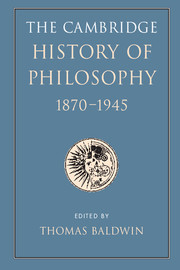Book contents
- Frontmatter
- Contents
- List of contributors
- Introduction
- I 1870–1914
- 1 Positivism, Idealism, and Pragmatism
- 2 Psychology and Philosophy
- 3 Logic, mathematics, and judgement
- 4 Philosophy and the new physics
- 5 The idea of social science
- 6 Ethics, politics, and legal theory
- 18 Utilitarians and idealists
- 19 Nietzsche
- 20 The new realism in ethics
- 21 Individualism vs. collectivism
- 22 Marxism and anarchism
- 23 Legal theory
- 7 Philosophy of religion and art
- Interlude
- II 1914–1945
- Biobibliographical appendix
- Bibliography
- INDEX
- References
23 - Legal theory
from 6 - Ethics, politics, and legal theory
Published online by Cambridge University Press: 28 March 2008
- Frontmatter
- Contents
- List of contributors
- Introduction
- I 1870–1914
- 1 Positivism, Idealism, and Pragmatism
- 2 Psychology and Philosophy
- 3 Logic, mathematics, and judgement
- 4 Philosophy and the new physics
- 5 The idea of social science
- 6 Ethics, politics, and legal theory
- 18 Utilitarians and idealists
- 19 Nietzsche
- 20 The new realism in ethics
- 21 Individualism vs. collectivism
- 22 Marxism and anarchism
- 23 Legal theory
- 7 Philosophy of religion and art
- Interlude
- II 1914–1945
- Biobibliographical appendix
- Bibliography
- INDEX
- References
Summary
LEGAL POSITIVISM IN ENGLAND, THE CONSTRUCTIVIST COUNTERPART IN GERMANY, AND THE BEGINNINGS OF THE INTEREST THEORY
Although Thomas Hobbes can be read as arguing that the obligations of the citizen are to be understood normatively, that is to say, in terms of an initial agreement to create and then to obey the sovereign, a later doctrine of sovereignty and obligation, grounded solely in matters of fact, carried the day in Britain. The paradigm of that doctrine, in both form and influence, is found in the legal philosophy of John Austin.
In his Lectures on Jurisprudence (1861–3), Austin refers more frequently to German treatises on pandect law than to the English case law. Still, it would be a mistake to cast him as a Romanist or pandectist rather than as the philosophically inclined English jurist he was. On his central doctrines of command and sovereignty in particular, the greatest influence stems from Jeremy Bentham. And this is hardly surprising. Austin, in Sarah Austin’s words, ‘looked up to [Bentham] with profound veneration’ as ‘the most original and inventive of all writers on Law’ (Ross 1893: 382).
Austin’s command doctrine captures the idea that directives or laws exist ‘by position’ (Austin 1861–3 [1885: 87, 171]), reflecting a power relation, that is, a relation between superior and inferior. The factual underpinnings of the power relation are clear: ‘[T]he term superiority signifies might: the power of affecting others with evil or pain, and of forcing them, through fear of that evil, to fashion their conduct to one’s wishes’ (1861–3 [1885: 96]). Applied to positive laws, Austin’s doctrine has it that commands are general, speaking to a class of acts or forbearances, and that the superior in the power relation is a political superior – most obviously the sovereign itself.
- Type
- Chapter
- Information
- The Cambridge History of Philosophy 1870–1945 , pp. 309 - 318Publisher: Cambridge University PressPrint publication year: 2003



